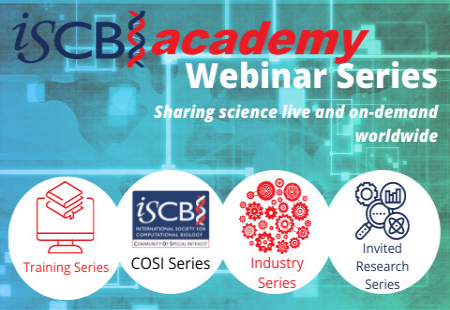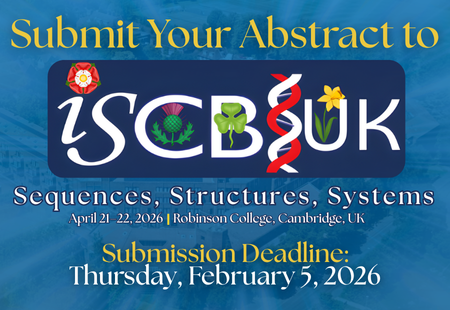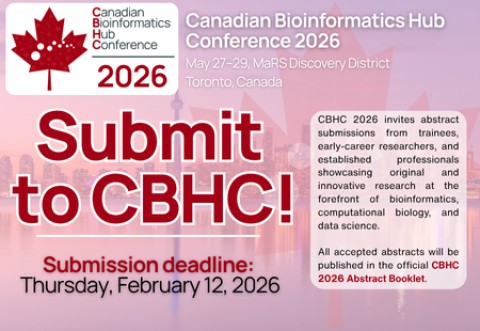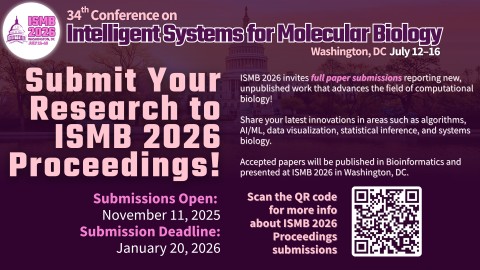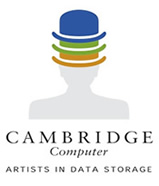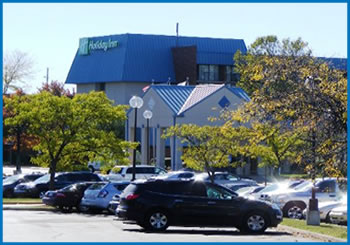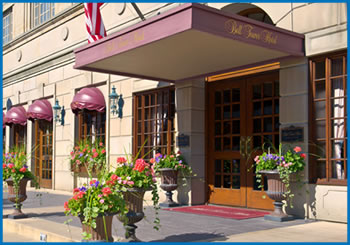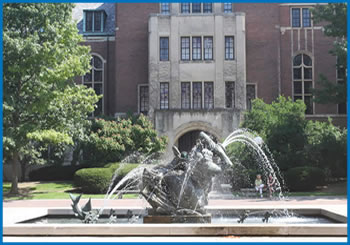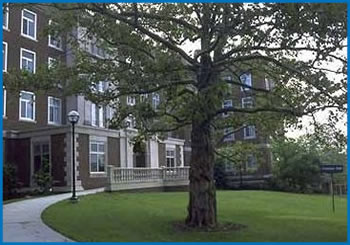|
go directly to: [Wednesday - May 16] [Thursday - May 17] |
|
|
--> MONDAY - May 14, 2012
|
4:00pm - 6:00pm
Registration (Concourse Room) |
|
4:00pm - 6:00pm
Group Hike
Nichols Arboretum
www.lsa.umich.edu/mbg/see/nicholsarboretum.asp
Nichols Arboretum "the Arb" is a 123 acre living museum set in the hills adjacent to the UM main campus. Originally designed by OC Simonds in 1906. Long views are framed by the Huron River Valley and unique plants. The Total hiking trail distance is just over 2 miles, with numerous points of interest and historical areas as well as viewing points of the surrounding areas. We will follow self-guided tours in small groups depending on the number of people who join us.
We will meet at the GLBIO Registration Area in the Michigan League (2nd floor, Concourse), at 4 pm and travel as a group to the hike start.
If you wish, you can meet us directly at the Nichols Arboretum, Washington Heights entrance (1610 Washington Heights; www.lsa.umich.edu/mbg/files/ArbGuide.pdf). We will be arriving there around 4:15pm - 4:20pm.
|
|
|
--> TUESDAY - May 15, 2012
|
8:00am - 5:00pm
Registration (Concourse Room) |
9:00am - 11:00am
Mendelssohn Theatre
...................................
Tutorial 1
High Performance Computing in Massive Omics Data
Ping Ma, Ph.D., Department of Statistics, University of Illinois
ABSTRACT: New discoveries in genomics and proteomics are profoundly changing our view of biological sciences. Notwithstanding these exciting developments, we are at an important crossroads in this area of endeavor. While analytical technologies are evolving at unprecedented speed, the biologists engaged in this enterprise are facing major computational and analytical challenges in analyzing the massive omics data. It calls for new computing strategies for genomics and proteomics to conduct large-scale analyses of complex biological systems, and to transform the massive data into reliable information for the extraction of new knowledge. Harnessing these methods for genomics and proteomics will certainly result in new computing technologies and algorithms for data analysis. |
9:00am - 11:00am
Vandenberg Room
...................................
Tutorial 2
RNA-Seq Approach to Study Gene Expression Profiles in Non-Model Organisms
Asela Wijeratne, Ph.D., Saranga Wijeratne, & Tea Meulia, Ph.D., Molecular and Cellular Imaging Center (MCIC), Ohio State University/OARDC
ABSTRACT: Transcriptome analyses provide fundamental insights into biological processes. High-throughput sequencing coupled with the development of bioinformatics tools allow transcriptome analyses in non-model organisms for which reference genome sequence and annotations are limited. We will demonstrate the use of a custom transcripome analysis pipeline, and discuss challenges for data analysis.
TUTORIAL LEVEL: Introductory to Intermediate
REQUIREMENTS: Attendees should have basic knowledge on high-throughput sequencing data technologies, familiarity with Illumina sequencing platform, knowledge of basic bioinformatics tools (Blast) and some familiarity with the GALAXY platform. As there will be hands on demonstration, participants are encouraged to bring their own laptop to the session. |
9:00am - 11:00am
Hussey Room
...................................
Tutorial 3
Using New Tools for Predicting 3D Structural Motifs in Non-coding RNAs
Neocles B. Leontis, Ph.D., Department of Chemistry & Craig Zirbel, Ph.D., Department of Mathematics and Statistics, Bowling Green State University
ABSTRACT: This session covers prediction of RNA 3D structure from sequence. Participants will learn about new resources which organize RNA 3D structures and known RNA motifs. Participants will get RNA sequences, fold them using standard programs, and use a new tool called JAR3D to predict the 3D structures of the internal and hairpin loops.
TUTORIAL LEVEL: Introductory/Advanced
REQUIREMENTS: The intended audience is molecular and systems biologists interested in non-coding RNAs, RNA 3D structure, and RNA function. Participants should bring their own laptops and an interest in RNA structure and function. After an initial overview of RNA 3D structure, the workshop will provide hands-on instruction in the navigation of the author’s website and use of their software. |
|
11:00am - 11:10am Break |
11:10am - 11:30am
Mendelssohn Theatre
...................................
Industry Track 1
Bioteam |
|
11:30am - 12:45pm Lunch Break (lunch on own) |
12:45pm - 2:45pm
Mendelssohn Theatre
...................................
Tutorial 4
An Informatics Platform for Processing Cancer ‘Omics Data
Victor Jin, Ph.D. & Xun Lan, Department of Biomedical Informatics, Department of Biomedical Informatics, The Ohio State University
ABSTRACT: The tutorial will demonstrate five specific tools:
1) W-ChIPeaks: A web application for processing ChIP-chip and ChIP-seq data;
2) BALM: A bi-asymmetric-Laplace model for analyzing MBD-seq;
3) HiCPeaks: a latent Poisson model for identifying interacting loci from Hi-C data;
4) W-ChIPMotifs: a web application tool for de novo motif discovery.
5) PORT: a portable ‘omics regulatory toolkit using HRTBLDb as an example.
TUTORIAL LEVEL: Intermediate
REQUIREMENTS: The tutorial is suitable for cancer biologists who apply different high throughput technologies to study cancers, attendees with a biology background who are interested in computation, |
12:45pm - 2:45pm
Vandenberg Room
...................................
Tutorial 5
Accessing Free, Large-scale Computation and Data Resources for Bioinformatics Through the eXtreme Science and Engineering Discovery Environment (XSEDE)
Philip Blood, Ph.D., & Alexander J. Ropelewski, Pittsburgh Supercomputing Center, Carnegie Mellon University
ABSTRACT: In certain bioinformatics applications (e.g. next generation sequencing) the cost and availability of computational and data storage resources presents a bottleneck that limits scientific progress. This tutorial will demonstrate how investigators can use NSF’s diverse, cutting-edge resources for open scientific research, integrated within XSEDE, to alleviate this bottleneck.
TUTORIAL LEVEL: Introductory to Intermediate
REQUIREMENTS: Some familiarity with the UNIX command line will be helpful, but not necessary, for this tutorial. It will not be possible to provide attendees with access to XSEDE resources during the tutorial due to time constraints, but researchers who already have access to these resources are welcome to follow along with the demonstrations.
|
12:45pm - 2:45pm
Hussey Room
...................................
Tutorial 6
Structural Variation Detection using Next-Generation Sequencing
Matthew Hayes, Ph.D. student & Jing Li, Ph.D., Computational Biology Lab, Department of Electrical Engineering and Computer Science, Case Western Reserve University
ABSTRACT: The tutorial will provide a survey of structural variation (SV) detection methods. It will cover common techniques for finding variants, including depth of coverage (DOC) methods, paired-end methods, and single-read methods. We will demonstrate how sequence read alignments are visualized, and we will demonstrate the use of a few SV detection programs to find structural variants in a cancer dataset.
TUTORIAL LEVEL: Introductory
REQUIREMENTS: Basic knowledge of next-generation sequencing platforms is assumed (particularly the Illumina platform). We also assume that the participants have a basic foundation in molecular biology and nucleic acids. |
|
2:45pm - 3:00pm Break |
3:00pm - 5:00pm
Mendelssohn Theatre
...................................
Tutorial 7
Practical Biological Network Visualization and Analysis
Igor Jurisica, Ph.D., Ontario Cancer Institute and University of Toronto
ABSTRACT: There are many visualization software packages, such as Cytoscape, VisANT, NAViGaTOR, Pajek, Osprey, Ondex, PathwayLab, Interviewer3, Geomi, Forg3d to name a few. Individual systems differ greatly in terms of features and standards they support, and consequently diverse analyses they enable. Considering complexity and diversity of data and tasks, there is no single best layout, no single best file format or visualization tool: one size does not fit all. One way to cope with these dynamics is to support multiple scenarios and workflows. Interactive data visualization and data mining proofs a useful approach.
Exploratory data analysis through network visualization remains a challenge. Overlapping nodes and edges make the interpretation of large networks difficult, so much so that these are sometimes referred to as “hairballs”. However, integrated network analysis and visualization is emerging as a fruitful approach to revealing patterns in data. Such an approach may lead to improved understanding of complex systems. Due to many different types of users and tasks, "one size does not fit all," and a useful tool needs to be: 1) flexible in satisfying diverse user needs through various workflows, 2) intuitive to allow for different displays with a mix of automated and manual improvements, and 3) scalable in terms of memory and speed, which is especially important for large graphs.
Our goal is to emphasize importance these aspects and directly involve tool developers and biologists in a dialogue during Q&A sessions to focus future development in the most useful direction and to increase awareness of helpful features. Prior to the tutorial, we will provide example datasets online, which will enable participants to experiment with specific workflows discussed.
TUTORIAL LEVEL: Introductory/Intermediate.
REQUIREMENTS: Only rudimentary biology knowledge will be required. The tutorial will include practical examples and participants are encouraged to bring their laptops, ideally with Internet connection so that online searches and datasets can be used. Prior to the tutorial, all related datasets and workflow examples will be provided on a web server. |
3:00pm - 5:00pm
Vandenberg Room
...................................
Tutorial 8
Knowledge-Based Interpretation of High Throughput Data
H.V. Jagadish, Ph.D., & Fernando Farf an, Ph.D., Department of Electrical Engineering and Computer Science, University of Michigan
ABSTRACT: In this tutorial we will showcase the use of novel approaches that exploit the rich information encapsulated in biological pathway graphs. We show how a thorough and rigorous analysis of biological pathways, using complex factors, can provide more meaningful hypotheses to describe the biological phenomena captured by high throughput experiments.
TUTORIAL LEVEL: Introductory |
3:00pm - 5:00pm
Hussey Room
...................................
Tutorial 9
RNA 3D Structural Motifs: Definition, Analysis, and Prediction
Christian Laing, Ph.D., Department of Biology and Department of Mathematics and Computer Science, Wilkes University & Jason Wang, Ph.D., Department of Computer Science, New Jersey Institute of Technology
ABSTRACT: RNA 3D structure is highly modular, composed of several repetitive patterns called 3D motifs. Determining 3D motifs is an important step in the RNA folding problem. In this tutorial we introduce the concept of RNA 3D motifs, provide examples, and describe the recent advances on 3D motif prediction and analysis.
TUTORIAL LEVEL: Introductory
REQUIREMENTS: Suitable for an audience with interests in RNA structure prediction and analysis. An introductory knowledge of statistics and data mining is desired but not required.
|
5:00pm - 5:20pm
Mendelssohn Theatre
...................................
Industry Track 2
Cambridge Computer
>> Click here for abstract
|
|
5:30pm - 7:30pm
Poster Session A and Reception (Ballroom)
Poster Session list by Last Name
Poster Session list by Number
|
|
|
--> WEDNESDAY - May 16, 2012
|
8:00am - 5:00pm
Registration (Concourse Room) |
9:00am - 10:00am
Keynote 1
...................................
Learning Population Histories from Genome Variation Data
Russell Schwartz, Professor
Department of Biological Sciences
and Lane Center for Computational Biology
Carnegie Mellon University
Pittsburgh, PA - USA |
|
10:00am - 10:10am Break |
10:10am - 10:30am
Mendelssohn Theatre
...................................
Industry Track 3
Compendia Bioscience |
10:30am - 12:00pm
Mendelssohn Theatre
...................................
WA1 Oral Presentations
Gene Regulations and Transcriptiomics
Session Chair: Shin-Han Shiu, Michigan State University
OP1, OP2, OP3, OP4, OP5, OP6
|
10:30am - 12:00pm
Hussey Room
...................................
WA2 Oral Presentations
Protein Structure & Function, Databases and Ontologies
Session Chair: Laura Brown, Michigan Technological University
OP7, OP8, OP9, OP10, OP11, OP12
|
12:00pm - 1:30pm Lunch Break (lunch on own)
|
1:30pm - 2:30pm
Keynote 2
...................................
Pathogen Diversity from an Ecological Perspective
Mercedes Pascual, Professor
Department of Ecology and Evolutionary Biology
Affiliate of the Center for Computational Medicine and Bioinformatics
University of Michigan
Ann Arbor, MI - USA |
2:30pm - 4:00pm
Mendelssohn Theatre
...................................
WP1 Oral Presentations
Evolution & Comp. Genomics, Population Genomics
Session Chair: Helen Piontkivska, Kent State University
OP13, OP14, OP15, OP16, OP17, OP18
|
2:30pm - 4:00pm
Hussey Room
...................................
WP2 Oral Presentations
Protein Interaction and Molecular Networks, Metagenomics
Session Chair: Madhavi Ganapathiraju, University of Pittsburgh
OP19, OP20, OP21, OP21, OP23, OP24
|
|
4:00pm - 4:15pm Break |
4:15pm - 5:15pm
Mendelssohn Theatre
...................................
S1 - Special Session
Proteins in Motion:
Computational Studies in Protein Flexibility and Dynamics
The knowledge of the dynamics and flexibility of protein structure is critical for understanding how proteins perform their functions. In recent years computational modeling of protein flexibility and dynamics has emerged and gained momentum. This modeling finds applications in various important areas, including modeling and prediction of protein disorder, protein-drug interactions, investigations of structure-function relationships, and modeling of folding and unfolding of proteins. These timely topics will be addressed in our special session.
Organized by Daisuke Kihara & Lukasz Kurgan
DESCRIPTION: The session addresses emerging developments concerning computational methods for elucidating protein flexibility and dynamics. These methods find applications in functional studies of proteins in various areas, including protein disorder, folding and unfolding of proteins, protein-drug interactions, and structure-function relationships focusing on ligand recognition.
SPEAKERS (order of the presentations):
- How to Mine Protein Flexibility for Inhibitor Selectivity
Leslie Kuhn
Department of Biochemistry & Molecular Biology
Computer Science & Engineering
Michigan State University
- Biomolecular Motors and Switches: From Machines to Drugs
Barry Grant
Department of Computational Medicine & Bioinformatics
University of Michigan
- Disorder in Proteins: Current Characterization Efforts
Lukasz Kurgan
Department of Electrical and Computer Engineering
University of Alberta, Canada
- Prediction of Real-Value Fluctuation of Proteins Using Static Structural Features
Daisuke Kihara
Department of Biological Sciences
Computer Science
Purdue University
|
|
4:15pm - 5:15pm
Hussey Room
...................................
S2 - Special Session
Computational Proteomics: Understanding Network Perturbations in Cancer
Organized by Rob M Ewing
>>Agenda Attached (.pdf)<<
DESCRIPTION: Interaction proteomics approaches are generating large-scale interaction maps, leading to new biological problems and computational challenges. This session will highlight analyticaland computational developments in the field of interaction proteomics and how these techniques may be applied to understanding interaction networks in cancer cells.
SPEAKERS:
-
Rob M. Ewing, Center for Proteomics and Bioinformatics
Case Western Reserve University - Alejando Balbin, Department of Pathology
University of Michigan Health System - Mehmet Koyuturk, Electrical Engineering and Computer Science, Case Western Reserve University
|
|
5:15pm - 7:15pm Poster Session B and Reception
Poster Session List by Last Name
Poster Session List by Number
|
7:30pm - 8:30pm
UMICH Museum Art Viewing
...................................
8:30pm to 10:00pm
Dinner and Keynote 3
...................................
Designing Bioinformatics for the Wetware. Usability Challenges with Massive Amounts of Data.
Howard Cash, President
Gene Codes Corporation
Gene Codes Forensics, Inc.
Ann Arbor, MI - USA |
|
|
--> THURSDAY - May 17, 2012
|
8:00am - 12:00pm
Registration (Concourse Room) |
9:00am - 10:00am
Mendelssohn Theatre
...................................
S3 - Special Session
Creating Teams for Bioinformatics - The educational challenge for biology and computer science at the undergraduate and graduate level: Four case studies from the Great Lakes area
Organized by Guenter Tusch
DESCRIPTION: The panel will explore the state of art of bioinformatics education in the Great Lakes Region by investigating different approaches at the undergraduate and graduate level under the aspect of future team building in research or industry.
SPEAKERS:
-
Robert Blumenthal, Ph.D., Department of Medical Microbiology & Immunology, Director of the Program in Bioinformatics& Proteomics/Genomics, College of Medicine, University of Toledo
-
Sorin Draghici. Ph.D., Endowed Chair in Systems Biology - Department of Obstetrics and Gynecology, Clinical and Translational Science, & Computer Science, Wayne State University
-
Neocles Leontis, Ph.D., Department of Chemistry, Bowling Green State University
-
Russell Schwartz, Ph.D., Department of Biological Sciences and Lane Center for Computational Biology, Carnegie Mellon University
|
9:00am - 10:00am
Hussey Room
Ohio
Bioinformatics Consortium Meeting |
|
10:00am - 10:15am Break |
10:15am - 12:00pm
Mendelssohn Theatre
...................................
RA1 Oral Presentations - Sequence Analysis
Session Chair: TBA
OP25, OP26, OP27, OP28, OP29, OP30, OP31
|
10:15am - 12:00pm
Hussey Room
...................................
RA2 Oral Presentations
Algorithm & Machine Learning, Bioimaging, Disease Models & Epidemiology
Session Chair: Guenther Tusch, Grand Valley State University OP32, OP33, OP34, OP35, OP36, OP37, OP38
|
12:00pm -1:00pm
Keynote 4
...................................
Mutation, Drift, and the Evolution of Subcellular Features
Michael Lynch, Professor
Department of Biology
Indiana University
Bloomington, IN USA |
|
1:00pm - 1:15pm Adjourn |
|
|
|
go directly to: [TOP] [Wednesday - May 16] [Thursday - May 17] |

